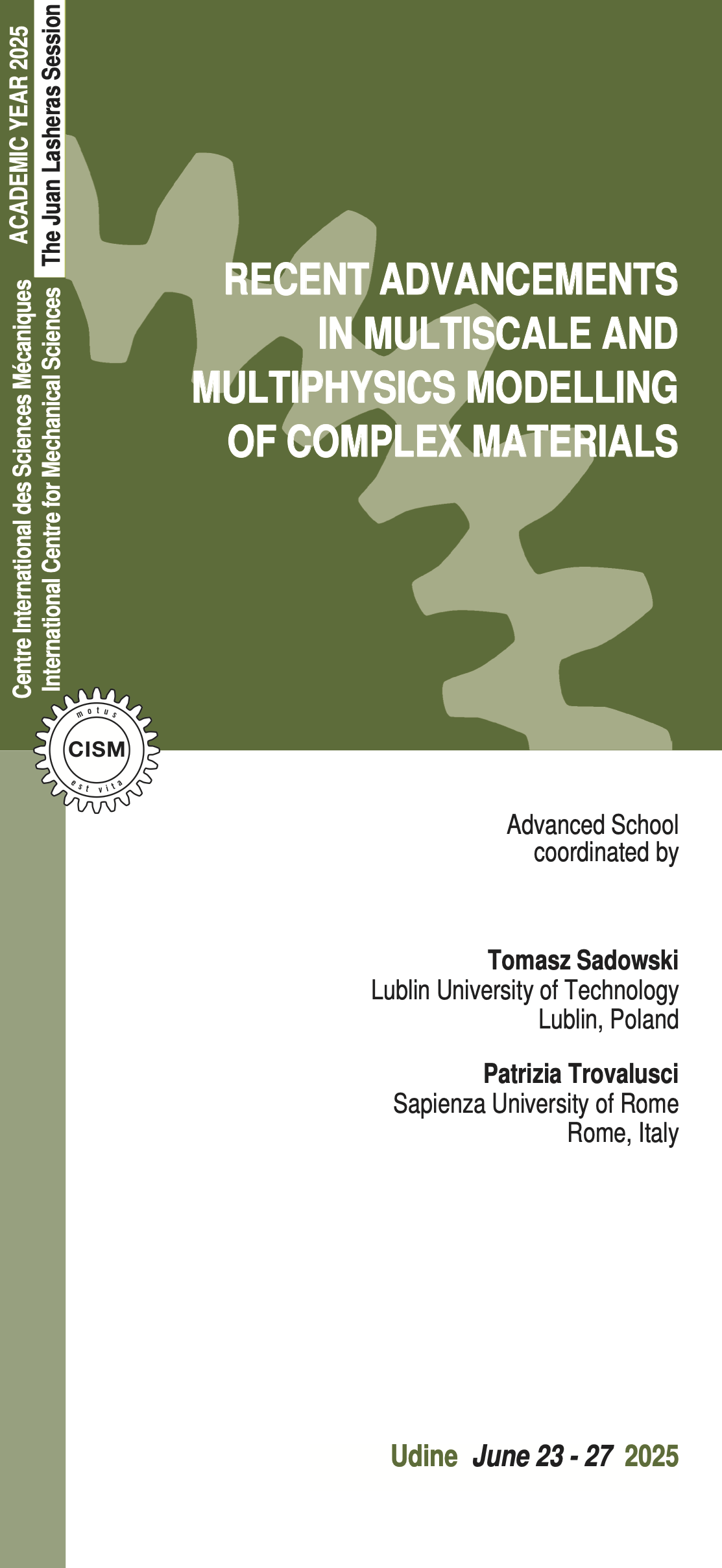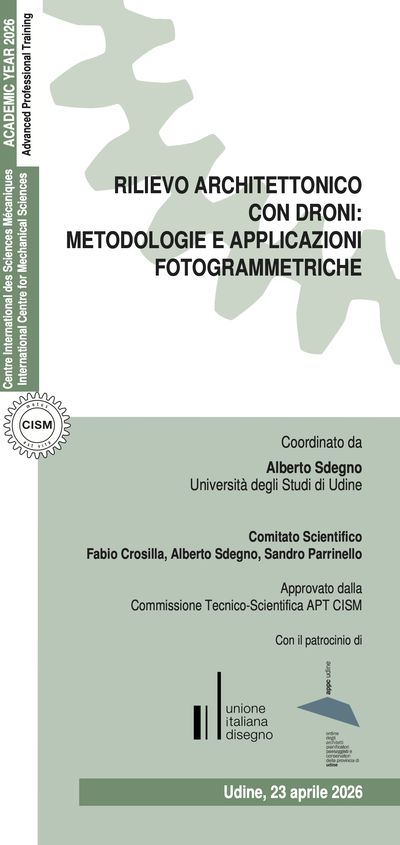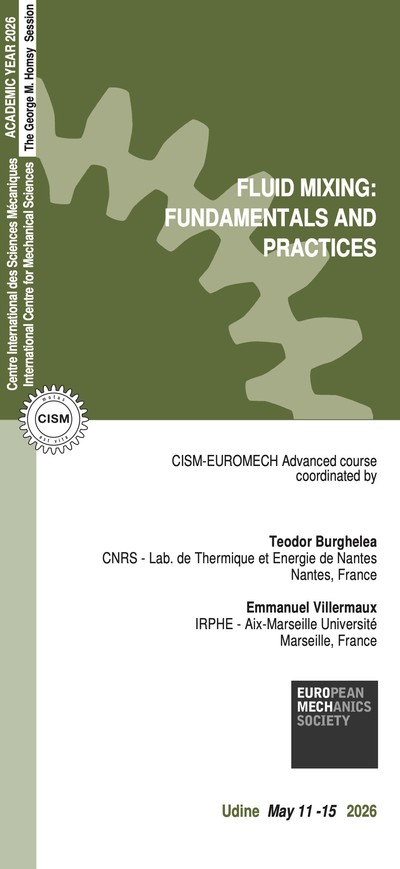Recent advancements in multiphysics and multiscale modelling of complex materials, which are materials endowed with microstructure, detectable at different scale levels (nano, micro, meso, macro), and characterised by a complex material behaviour (plasticity, damage, fracture) are required by novel applications.
Advanced composites (ACs), consist of various components (metal, polymer, ceramic, etc.) with complicated internal architectures, including porosity, and reinforcement with fibres or particles of different properties, shapes, and sizes. Optimal distribution of the (1) reinforcing phase within the matrices or (2) different phases in multiphase materials is the major task in designing complex composites to get the required material response to the various kinds of loads. The AC’s macroscopic properties are subjected to multi-degradation phenomena which are governed by multiphysics processes that occur at one to several scales below the level of observation, suggesting the application of multiscale approaches. A thorough understanding of how these processes influence the reduction of stiffness and strength is of key importance for the analysis of existing, and the design of improved, complex materials. It is widely recognized that important macroscopic material properties, such as stiffness and strength, are governed by processes occurring at one to several scales below the macro-observation. A thorough understanding of how these processes influence gross behaviour is key to the analysis and the design of existing and/or performance-improved composite materials (multiscale analysis).
The recent advancement in applied computer science and artificial intelligence in the multiphysics modelling of materials aims at modelling of multi-damage and failure processes, validated through experimental assessment of local mechanical properties and microstructures. For example, data-driven parametrically-upscaled constitutive models with machine learning and uncertainty quantification are a novel idea which proposes a parametric representation of lower-scale microstructural descriptors expressed as functions of representative aggregate microstructure parameters including data information about microstructural morphology and crystallography. The application of a machine learning tool is utilized for the generation of constitutive descriptors. Moreover, recently proposed non-local data-driven models for green ACs with particular emphasis on the derivation of the formulation of non-classical models for materials continua and the description of the necessary algorithms and procedures adopted to develop the proposed multiscale model.
Furthermore, innovative multiscale modelling strategies applied to the study of ACs under static and fatigue loading to crack initiation on atomistic and microstructural length scales as well as macroscopic final failure using scale-appropriate methods will be also of interest for the course, to compare these approaches with experimental results for many practical cases. The course also covers recent developments in the modelling of complex materials as non-local continua obtained through the adoption of multiscale approaches.
Sadowski T., Trovalusci P. Eds. (2014): Multiscale Modelling of Complex Materials, CISM Courses and Lectures No. 403, International Centre for Mechanical Sciences, Wien NewYork. Springer, Vol. 556.
Ghosh S. (May 2024), Machine learning-enabled parametrically upscaled constitutive models for bridging length scales in Ti and Ni alloys, in: Innovative Lightweight and High-Strength Alloys, Mohammed A. Zikry (Ed.), Elsevier.
Weber G., Pinz M. and Ghosh S. (December 2022), Machine learning-enabled self-consistent parametrically-upscaled crystal plasticity model for Ni-based superalloys, Computer Methods in Applied Mechanics and Engineering, Vol. 402, Art. 115384.
Trovalusci P., Pau A. (2014), Derivation of microstructured continua from lattice systems via principle of virtual works. The case of masonry-like materials as micropolar, second gradient and classical continua. Acta Mechanica, 225 (1), 157-177.
Trovalusci P., Ed. (2016): Materials with Internal Structure. Multiscale and Multifield Modeling and Simulation, Springer Tracts in Mech Engn Series, Springer, Vol 18.
Xu, Y., Kuang, Z., Yang, J., Huang, Q., Huang, W., Hu, H. (2024), Quantum computing enhanced distance-minimizing data-driven computational mechanics, Computer Methods in Applied Mechanics and Engineering 419, 116675.
Yang, J., Huang, W., Huang, Q., Hu, H. (2022), An investigation on the coupling of data-driven computing and model-driven computing. Computer Methods in Applied Mechanics and Engineering 393, 114798.
Postek E., Sadowski T. (2021), Impact model of the Al 2 O 3 /ZrO 2 composite by peridynamics, Compos. Struct. 271, 114071.
Schmauder, S., Schäfer, I. Eds. (2016), Multiscale Materials Modeling: Approaches to Full Multiscaling, De Gruyter.
5 lectures on: Non-local data-driven Modelling for Advanced Green Materials.
Application of non-local modelling strategies in non-classical continua by considering industrial applications for advanced green and sustainable materials in civil, mechanical and biomedical engineering will be discussed.
5 lectures on: Data-Driven Parametrically-Upscaled Constitutive Models (PUCM) with Machine Learning and Uncertainty Quantification for Multiscale Modeling of Fatigue and Damage in Metals and Composites.
The Parametrically-Upscaled Constitutive Models incorporate a parametric representation of lower-scale microstructural descriptors in higher-scale constitutive coefficients.
5 lectures on: Data-driven Computational Mechanics for Composite Materials and Structures.
The lectures cover constitutive data generation techniques, quantum computing enhanced data-driven algorithms and data-model-coupling techniques. The lectures focus on the data-driven computational mechanics for composite materials and strictures, including data generation techniques, quantum computing enhanced data-driven algorithms and data-model-coupling techniques.
5 lectures on: Modelling and Experimental Assessment of Multi-Damage Processes and Fracture of Ceramic and Metal-based Composites.
The lectures cover a description of (1) experimental assessment of local mechanical properties by micro-indentation, (2) modelling with a triple-scale approach starting from the atomistic description.
4 lectures on: Multiscale and Multiphysics Modeling of Materials Behaviour.
Content: (1) Introduction to multiscale and multiphysics modelling, (2) Introduction to an atomistic approach by applying atomistic Monte Carlo simulations, (3) Micromechanical Modelling of Complex microstructures, and (4) Meso, Macro and Damage Mechanics.
5 lectures on: Multiscale approaches for the modelling of complex materials as discrete-to size dependent non-local continua.
Derivation of macroscopic constitutive laws for non-classical continua (micromorphic, etc.), i.e. non-local models with internal length and dispersive properties, by defining direct links with lattice systems.





